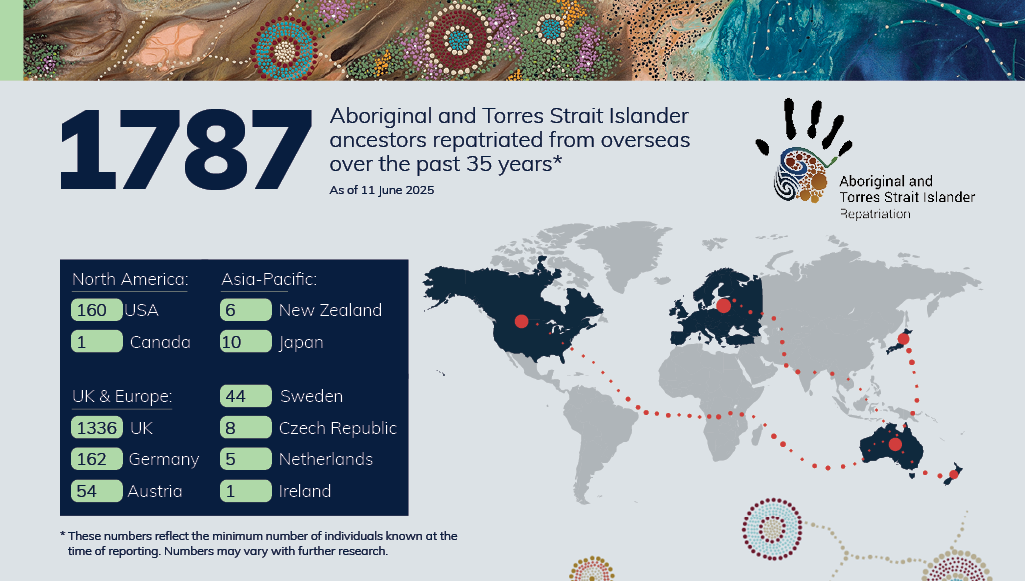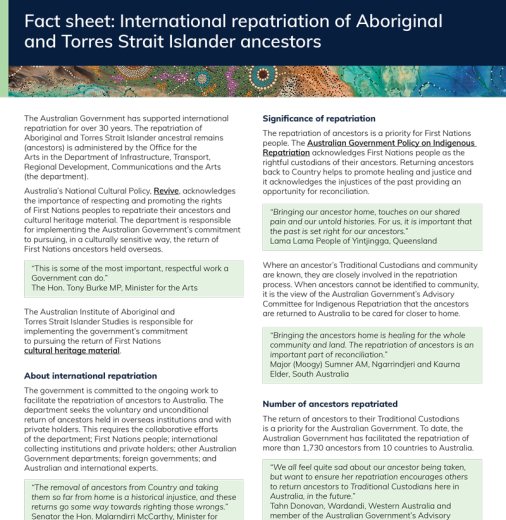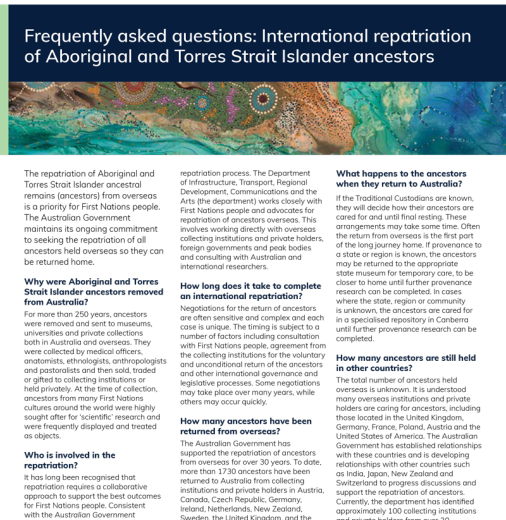National Cultural Heritage Committee
The National Cultural Heritage Committee is made up of ten people with expertise in Australia's cultural heritage.
The Committee is responsible for:
- assessing export permit applications and making recommendations to the Minister for the Arts about if a permit should be granted
- assessing funding applications from the National Cultural Heritage Account
- assessing expert examiner applications
- advising the Minister for the Arts about issues related to cultural heritage.
The Minister for the Arts appoints the Committee under the Protection of Movable Cultural Heritage Act 1986. Members serve for terms of up to four years. They can be reappointed.
The Committee is made up of:
- four people from different collecting institutions
- an Aboriginal or Torres Strait Islander nominated by the Minister for Indigenous Affairs
- an individual nominated by Universities Australia
- four people with experience relevant to the cultural heritage of Australia.
The current members are:
- Professor Martin Gibbs—Professor of Australian Archaeology, University of New England, Armidale
- Mr Simon Elliott—Deputy Director, Collection and Exhibitions, Queensland Art Gallery
- Ms Jane Stewart—Manager of Engagement, State Libraries and Archives Tasmania
- Dr Tim Sullivan—Consultant, museums and heritage
- Ms Louise Tegart—Director, Art Gallery of Ballarat, Victoria
- Dr Geraldine Mate—Principal Curator, History, Industry and Technology, Queensland Museum
- Dr Stephen Gilchrist—Senior Lecturer, School of Indigenous Studies, University of Western Australia
- Dr Zoe Rimmer—Assistant Director, Aboriginal Heritage Tasmania, Department of National Resources and Environment Tasmania
- Ms Tina Baum—Senior Curator, First Nations Art, National Gallery of Australia
Movable cultural heritage expert examiners
Expert examiners assess the significance of cultural material that is proposed for export from Australia.
The Protection of Movable Cultural Heritage Act 1986 (the Act) also provides for the return of cultural property to a foreign country if that property was unlawfully exported from that country and imported into Australia. To assist with this process, the Office for the Arts may request assistance from expert examiners with appropriate expertise in areas outside of Australian cultural property.
The work of expert examiners is vital to the operation of the Act. As an expert examiner, you will be listed on a register maintained by the National Cultural Heritage Committee.
What do expert examiners do?
For Australian protected objects, expert examiners:
- establish if material is classed as an Australian protected object by assessing if it meets the criteria in the National Cultural Heritage Control List
- advise if the material is so important to Australia that its loss through export would significantly diminish Australia's cultural heritage.
If you are eligible, you will be paid an honorarium of $350 per assessment.
The National Cultural Heritage Committee reviews expert examiner assessments and makes a recommendation to the Minister for the Arts, who makes the final decision about granting a permit.
For foreign cultural property, expert examiners:
- establish if the material is authentic
- if the material is authentic, advise the country of origin in present-day terms and the possible significance of the material to that country.
How to register as an expert examiner
Expert examiners are recognised experts in a particular field, and are registered on the basis of their employment, professional qualifications and expertise in their chosen field.
An expert examiner may seek to register as an individual or on behalf of an organisation.
To register your interest to become an expert examiner, submit an application using the Department's online application portal: Expert Examiner Register—Arts (smartygrants.com.au).
If you have an questions or experience difficulties using the online application form, please contact the Cultural Property team on 1800 819 461 or email movable.heritage@arts.gov.au for assistance.
Fact sheet
Published 1 August 2022
Movable cultural heritage
Australia is committed to protecting national and foreign movable cultural heritage.
Movable cultural heritage may include artworks and historical, archaeological, numismatic, philatelic, science or technology objects.
The Protection of Movable Cultural Heritage Act 1986 ensures objects that have cultural significance remain in Australia. The Act also provides for the return of foreign cultural property which has been illegally exported from other countries and imported into Australia.
The Protection of Movable Cultural Heritage Regulations 2018 contain the National Cultural Heritage Control List, which specifies the categories of Australian cultural property subject to export control. The Explanatory Statement outlines the purpose of the Regulations.
The Regulations were amended in 2021 and 2025 to facilitate the international exhibition of certain categories of Aboriginal or Torres Strait Islander artworks, and to enhance the protection of certain Victoria Cross medals of significance. The most recent amendments are outlined in the accompanying Explanatory Statement.
Australia is part of the international effort to protect and safeguard the world's cultural heritage, guided by the UNESCO Convention on the Means of Prohibiting and Preventing the Illicit Import, Export and Transfer of Ownership of Cultural Property 1970.
Australia is also committed to the 2030 Agenda for Sustainable Development though strengthening efforts to protect and safeguard the world's cultural heritage.
If you buy cultural material in Australia or from overseas, you need to ensure that any import/export is compliant with relevant cultural property laws. For more information, please refer to the fact sheet.
Protecting movable cultural heritage fact sheet
Published 1 August 2022—PDF and DOCX files available:
In Australia, national and foreign cultural heritage is protected by our laws. Australian cultural property objects are significant to the nation's identity. It is important all cultural heritage items are imported and exported legally.
National Cultural Institution KPI Infographics 2020–21—results and trends (including text version)
2020–21 results

Arts engagement 2020–21
- Line drawing of people outside of the National Museum of Australia, National Library of Australia and the National Gallery of Australia with the text 7.6 million visits to the National Collecting Institutions
- Three pie charts depicting:
- 5.0 million off-site
- 2.6 million on-site
- 79,019 on-site students* (*As part of an organised educational group)
Arts access 2020–21
- Two pie charts depicting visitors from across Australia accessing the National Collecting Institutions
- On-site visitors (81.9% major cities, 17.4% inner and outer regional, 0.5% remote and very remote)
- Off-site visitors (68.7% major cities, 30.2% inner and outer regional, 1.2% remote and very remote)
- Image of a computer screen with the text 43.1 million website sessions
- Visits to the National Cultural Institutions' websites included 226 million page views and averaged 5.2 page views per session (image of a thumbs up icon)
Arts education 2020–21
- Line drawing of a generic building with the text 2,544 school visits to the National Collecting Institutions* (*On-site, off-site and online visits)
- Program visits line graphic depicting
- 266,000 public program visits
- 1,553,000 student program visits, which was a record result
- Survey results
- 96% teachers reported an overall positive experience of their visit (image of a star icon)
- 96% teachers reported relevance to the classroom curriculum (image of a tick icon)
- 96% public program visitors reported overall satisfaction with their experience, which was a record result (Image of a thumbs up icon)
Arts development support 2020–21
- 180 projects selected for festivals
- 121 national (line drawing of a map of Australia)
- 59 international (line drawing of a globe)
- 20.9 million attendances at Australia Council supported activities (line drawing of three figures depicting an adult with two children)
- 148.5 million cumulative audience of Screen Australia supported TV productions, which was a record result for the NCI reporting period from 2012–13 to 2020–21 (line drawing of a TV)
- 688 new Australian artworks projects supported (line drawing of a figure walking up to an artwork)
Collections 2020–21
- 12.1 million total collection size, which is a record result (line drawings of five cubes)
- Total collection size 236,000 larger than 2019–20
- Over 2.3 million objects digitised, which was a record result (text inside an image of a computer screen)
- Over 8.6 million objects were available to the public* (*The total objects available to the public includes objects that were on display, online, on tour, or otherwise available to the public)
- 14,458 objects were available on display
- 1,783,143 objects were available online, which was a record result
- 485 objects were available on tour
Initiatives, collaboration and volunteering 2020–21
- Line drawing of seven people with the text 1,861 volunteers generously gave their time to the National Collecting Institutions
- 124 full time equivalent
- Line drawing of a globe with the text 242 initiatives that strengthen ties with other countries
- Line drawing of a mortar board with the text 1,416 collaborations with cultural and educational institutions
2020–21 trends

Arts engagement 2020–21
- Line graph of visits to the National Cultural Institutions' websites
- 2016–17—40,509,000
- 2017–18—46,576,000
- 2018–19—49,512,000
- 2019–20—47,311,000
- 2020–21—43,093,000
- Line graph of on-site visitor numbers, which continued to fall as National Collecting Institutions experienced restrictions due to COVID-19
- 2016–17—10,734,000 total visits, 4.6 million on-site visits, 6.1 million off-site visits
- 2017–18—9,963,000 total visits, 4.5 million on-site visits, 5.4 million off-site visits
- 2018–19—10,644,000 total visits, 4.5 million on-site visits, 6.1 million off-site visits
- 2019–20—11,575,000 total visits, 3.2 million on-site visits, 8.3 million off-site visits
- 2020–21—7,588,000 total visits, 2.6 million on-site visits, 5.0 million off-site visits
Arts audience and attendance 2020–21
- Line graph depicting attendance at Australia Council supported activities, including line drawings of a violin, megaphone and theatre masks
- 2016–17—16.3 million
- 2017–18—22.7 million
- 2018–19—22.6 million
- 2019–20—25.5 million
- 2020–21—20.9 million
- Cumulative audience of Screen Australia supported TV productions, including a line drawing of a TV and people
- 2016–17—141.1 million
- 2017–18—113.2 million
- 2018–19—130.8 million
- 2019–20—1115.8 million
- 2020–21—148.5 million, which was a record result
Arts education 2020–21
- Bar graph depicting how public programs and school visits continued to fall as National Collecting Institutions and schools experienced restrictions due to COVID-19
- 2016–17—459,000 student program visits, 589,000 public program visits, 1,048,000 total
- 2017–18—937,000 student program visits, 685,000 public program visits, 1,622,000 total
- 2018–19*—785,000 student program visits, 713,000 public program visits, 1,498,000 total
- 2019–20*—854,000 student program visits, 487,000 public program visits, 1,341,000 total
- 2020–21*—1,553,000 student program visits RECORD RESULT, 266,000 public program visits, 1,819,000 total
*Since 2018–19 student program visits include students engaging with virtual excursions and online courses
- Line drawing of a bus depicting the number of schools that visited on-site and off-site
- 2016–17—6,157
- 2017–18—6,434
- 2018–19—6,549
- 2019–20—5,135
- 2020–21—2,138
Collection development 2020–21
- Line drawing of an increasing number of cubes depicting how the number of objects in our national collections is increasing
- 2016–17—10,563,000 (7,361,000 objects available to the public)
- 2017–18—10,662,000 (7,572,000 objects available to the public)
- 2018–19—11,269,000 (8,129,000 objects available to the public)
- 2019–20—11,879,000 (8,724,000 objects available to the public)
- 2020–21—12,115,000 (8,657,000 objects available to the public), which is a record result
Arts digitisation and online access 2020–21
- Objects digitised in our national collections, with line drawings of computer screens increasing in size
- 2016–17—1,052,000
- 2017–18—1,101,000
- 2018–19—1,244,000
- 2019–20—2,131,000* (*The significant increase in digitised items in 2019–20 is due to the inclusion of born digital items by one National Collecting Institution for the first time)
- 2020–21—2,364,000 (19.5% of the collection digitised), which is a record result
- Line drawing of an eye depicting how the proportion of objects available to the public online is increasing
- 2016–17—7.6%
- 2020–21—14.7%, which is a record result
Arts development and support 2020–21
- Number of projects supported, accompanied by a line drawing of a film reel and a screen
- 2016–17—6,858 new Australian artwork projects, 383 culturally diverse projects and events
- 2017–18—10,461 new Australian artwork projects, 509 culturally diverse projects and events
- 2018–19—9,966 new Australian artwork projects, 484 culturally diverse projects and events
- 2019–20—11,414 new Australian artwork projects, 1,157 culturally diverse projects and events
- 2020–21—688 new Australian artwork projects, 630 culturally diverse projects and events
- Bar graphs of the number of projects selected for festivals, accompanied by line drawings of a musical note, tickets and a pencil
- 2016–17—91 national, 111 international
- 2017–18—53 national, 51 international
- 2018–19—147 national, 117 international
- 2019–20—163 national, 99 international
- 2020–21—121 national, 59 international
International highlights

10 First Nations Ancestors returned in first repatriation from Japan
June 2025—Japan

On 11 June 2025, three Japanese collecting institutions came together to acknowledge the importance of returning ten Aboriginal and Torres Strait Islander ancestral remains (ancestors) to their Traditional Custodians and representatives from the Australian Government so they can be returned to Australia.
The Australian and Japanese governments have been working closely together with mutual respect to support the return of ancestors back to their country of origin. This return marks the first repatriation of ancestors from Japan. The return of ancestors back to Australia and back to Country is significant for healing for First Nations people.
The ancestors were returned by the University of Tokyo, the National Museum of Nature and Science Tokyo and the Kyoto University.
The University of Tokyo was the first Japanese collecting institution to agree to repatriate the seven ancestors held in their care. This includes one ancestor who was removed from Adelaide, South Australia. Mitzi Nam, Kaurna Nation travelled to Tokyo to receive the Kaurna Old Person and accompany her home. Mitzi reflected 'for many years the ancestral remains of Kaurna Old People and neighbouring Nations were collected by museums and universities without consent which caused great sadness and anger which has been carried for generations. While past wrongs cannot be forgotten, pathways to healing can start for all generations'.
Another Kaurna community member, Jannaya Williams, added, 'Repatriation connects us back to the spirit of our land, the vibration of the country, land, sea and sky that is our song, dance and lore. To the knowledge that our Old People, our ancestors are always with us. It is a chance to restore the circle that was broken, a circle that links past, present and future'.
The Kyoto University returned two ancestors who were removed from Western Australia. Representatives from the Bardi and Jawi community, Dampier Peninsula, and Yawuru community, Broome, both of the Kimberley region travelled to Tokyo to receive their ancestors and accompany them home.
Bolo Angus, Bardi and Jawi, Western Australia stated that 'repatriation is a vital step toward healing the deep wounds caused by the forced removal of our ancestors from their resting places. For our community, it is not just about bringing bones home—it is about restoring dignity, honouring our old people, and reconnecting spirit to Country. This healing is not only for us, the living, but for the spirit of the ancestors who have waited so long to come home'.
Uncle Neil McKenzie, Yawuru, Western Australia said 'It is important to bring the ancestors back to their Country and it is our cultural responsibility to ensure that this happens. The return of our Yawuru ancestor acknowledges the truth of Yawuru history and the treatment of our ancestors who were removed from Country without consent. We hold genuine hope that this process of truth telling will enable us to gain respectful recognition, so that we can move forward in a truly reconciled manner, leading to collective healing and empowerment'. Jason Richardson, a Yawuru and Bardi man, said: 'I am extremely honoured and privileged to play a role in bringing our ancestors home to their rightful resting place'.
The University of Tokyo and the National Museum of Nature and Science, Tokyo also returned seven other ancestors to the stewardship of the Australian government so they can be cared for closer to home.
Media Release—10 First Nations Ancestors welcomed home from the first repatriation from Japan
International Repatriation
The Australian Government has supported international repatriation for over 35 years. This has seen the repatriation of over 1785 ancestors. The Australian Government maintains its commitment to securing the return of ancestors held overseas so they can be returned to their Traditional Custodians or held in safe care in Australia until their Traditional Custodians can be identified.
We are currently working with collecting institutions in the United States of America, the United Kingdom, Germany, India, Switzerland and New Zealand to progress repatriations. We have a joint arrangement with France and are working closely with other countries to advocate for the return of ancestors. When the Traditional Custodians are known, we work closely with them as they advise on the return of their ancestors, cultural protocols and any access and controls for associated material. The Traditional Custodians make all decisions regarding the final resting place of their ancestors.

More information
There is more information on international repatriation on the fact sheets below. You may also like to listen to the experiences of Jim Bett’s, the department’s Secretary, who participated in a repatriation in April 2025 to return 36 Queensland Aboriginal ancestors from the Natural History Museum in London, United Kingdom.
Contact:
Email repatriation@arts.gov.au.
Phone: 1800 006 992
Frequently asked questions—Cultural Gifts Program
Donors
Public institutions
Valuers
2005 Convention on the Protection and Promotion of the Diversity of Cultural Expressions
Australia is a party to the UNESCO Convention to protect and promote the Diversity of Cultural Expressions.
The UNESCO Convention on the Protection and Promotion of the Diversity of Cultural Expressions seeks to ensure the rich diversity of culture and strengthen creation, production and access to cultural activities, goods and services worldwide.
UNESCO is the United Nations Educational, Scientific and Cultural Organisation.
Australia has been a party to the convention since 2009. Under the convention, Australia reports every four years to the relevant UNESCO Intergovernmental Committee on what has been done to protect and promote the diversity of cultural expression in Australia and internationally.
Find out more



















